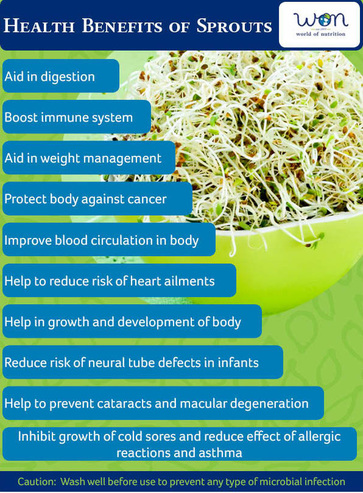WON Tips
Get the latest health & wellness and DIY tips from the friendly and knowledgeable staff at WON.
 Ask Kris Anything: One of the things I get asked the most is "what do you eat?" One of my favorite things to eat are sprouts. You might be asking, what exactly are sprouts? Sprouts are germinated seeds of legumes or grains. Well, there are a lot of different types - almost as many as there are edible plants. Bean sprouts, sunflower sprouts, rye sprouts...every plan-based food started with a sprout and free from there. Grains, seeds, and legumes can all be sprouted and are considered a wonder-food because of their high nutritional value. In Naturopathy, sprouts are referred to as a medicine. Health Benefits of Sprouts: The sprouts contain a greater concentration of nutrients like Vitamin E, potassium, iron, phytochemicals, antioxidants, bioflavonoids, chemoprotectants and protein. They also contain other nutrients like folic acid, zinc, niacin, riboflavin, copper and magnesium which are very good for hair. The most fascinating thing to me about sprouts is their high protein content. I have been moving towards a raw vegan diet and I love finding sources of protein while avoiding beans (because I don't digest them well). Most varieties of sprouts contain as much as 35% protein. Here is a breakdown of protein content for the following varieties of sprouts:
Growing Sprouts: Sprouts are very easy to prepare and require little or no maintenance. You can easily grow these seeds on your windowsill. To start, add 2 TBSP to a sprouted or mason jar with a special sprout lid, soak for 4-6 hours, rinse and leave it in a well-lit location, rinse twice daily with filtered water, drain and lay the jar on its side. Germination time will vary between three to eight days, according to your room temperature. Harvest it early for a sweet taste. You can use the sprouts immediately without cooking or freeze them for future use. Selection & Storage:
Sprout Safety: Sprouts are safe for everyone when handled properly. Those related to salmonella outbreaks were commercially grown. Organic seeds have never been implicated in a single case of salmonella poisoning. Certified organic seeds are handled in a manner that minimizes any possibility of contamination. Choosing only organically grown sprouting seeds and growing your own sprouts will give you one of the safest, healthiest, most nutritious foods available anywhere. We carry a variety of sprouts, books on sprouting and sprout supplies at World of Nutrition. I am an avid sprout grower and currently have 3 jars going in a rotation. Next time you are making a salad, add some sprouts!
1 Comment
Nicole
8/4/2016 12:19:05 pm
There are some spelling and grammatical errors in the article.
Reply
Leave a Reply. |
Archives
October 2016
Categories |
